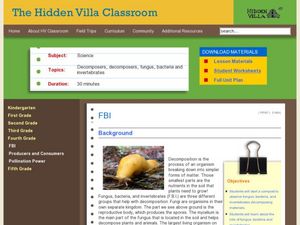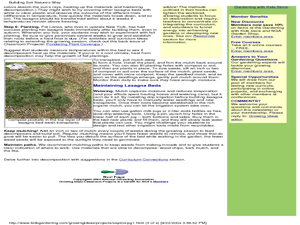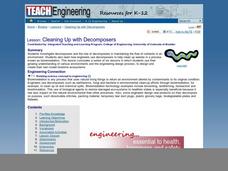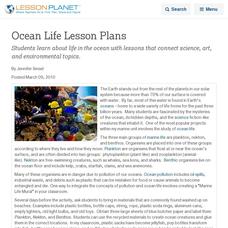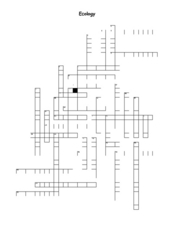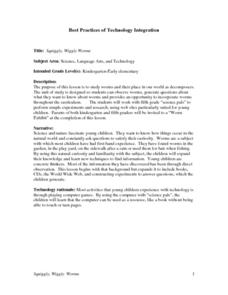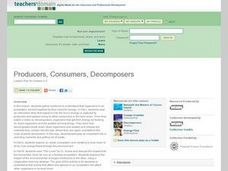NASA
Decomposers Get Energy From Dead Things
When life gives you mold, make penicillin. Scholars design an inquiry experiment to determine what causes rotting and mold growth. It also covers decomposers and the important role they play for other living things.
Curated OER
FBI
Fourth graders experiment with compost. In this Science lesson, 4th graders begin a worm compost as well as an outdoor compost. Students discuss decomposition.
Curated OER
Building Soil Nature's Way: Exploring decomposition and soil health
Students explore decomposition and soil health by creating their own garden. In this agriculture activity, students build a "lasagna garden" with organic matter found in the area and plant perennials native to their region....
Curated OER
Biological Relationships
Create a written document to show knowledge of producers, consumers, decomposers, and symbiotic relationships. To investigate food consumption, your classes will differentiate between types of symbiosis and explain examples of each.
Curated OER
it's Lonely At The Top
Students explore the differnences between food producers in food webs and food consumers in food chains. Behavioral choices of primary and secondary consumers such as herbivores, vegetarians, carnivors, and omnivors are analyzed.
Curated OER
F.B.I.
Students create a worm bin full of fruit and vegetable scraps wit paper and observe what happens over time. For this decomposers lesson plan, students observe that the fruit and vegetable scraps become new soil.
Curated OER
Composting
Using 2-liter bottles, junior ecologists create composting tubes in which they place nitrogen-rich and carbon-rich materials. They observe what changes occur over two weeks' time. Provide more specific direction to your class as to what...
Curated OER
Cleaning Up With Decomposers
Students read and discuss decomposers and how they affect the environment. In this decomposers lesson plan, students also discuss how engineers use decomposers to help the environment.
Curated OER
Nutritional Relationships Chart
Producers, Herbivores, Carnivores, Decomposers, oh my! Help organize the intricacies between these four types of eaters with this biology worksheet. Scientists display nutritional relationships in a graphic organizer. They place 15 terms...
Curated OER
Ocean Life Lesson Plans
Students learn about life in the ocean with lessons that connect science, art, and environmental topics.
Curated OER
Eco-Detectives
Students explore natural decomposers. In this decomposing activity, students participate in a WebQuest to discover how nature handles decomposition. Students compare natural methods for decomposition with recycling efforts.
Curated OER
Ecosystem Game
Students examine the ecosystem by playing a game. In this ecosystem lesson, students are put into groups of decomposers, consumers, and producers. Students create a list of animals that fit into each group and items that represent...
Curated OER
Ecology Study Guide
In this ecology study guide, students fill in a table about producers, consumers and decomposers, they draw the water cycle, they fill in diagrams about cell respiration, the food pyramid, protein synthesis and nitrification, population...
Curated OER
Mini-Ponds
In this mini pond worksheet, students create a mini-pond ecosystem with soil, water, and plant life. Students let their ecosystem sit for a day and they observe a sample the next day. Students identify all the pond water microorganisms...
Curated OER
Flow of Energy Through An Ecosystem
For this flow of energy in an ecosystem, students complete a graphic organizer and show the flow of energy from the sun to producers, primary consumers, secondary consumers, tertiary consumers and then decomposers. Students define each...
Curated OER
Yucky Worm World
In this earthworm worksheet, students use an on line site to answer questions about the structures and their functions of an earthworm. They also answer questions about planarians, leeches and tapeworms.
Curated OER
Our Friends or Foes
For this living organisms worksheet, 6th graders choose the multiple choice answer to 10 questions. Students then read and answer 10 statements as true or false and fill in the blanks to 5 statements.
Curated OER
Energy Through the Ecosystem
In this ecosystem worksheet, students use a diagram of an ocean-based food web to complete 5 short answer questions about the energy flow through this ecosystem.
Curated OER
Ecology
In this ecology worksheet, 6th graders will review ecology vocabulary words by circling the word that doesn't belong in each group of words for 6 questions. Then students will determine if 9 statements relating to animal and plant roles...
Curated OER
Squiggly, Wiggly Worms
Students, who are in early elementary grades, pair with fifth grade students to study worms. They observe worms in experiments, create research questions, and complete the research using Internet sites. They participate in a "Worm...
Curated OER
The Mighty Hudson Stretches its Mussels
Students brainstorm possible causes of zebra mussel migration and population expansion. They identify the key causes and effects of the disturbance of the Hudson River ecosystem and research causes and effects in the disturbances of...
Curated OER
Food Chains
Fourth graders study food chains, producers, consumers, and decomposers. They play a food chain game and create food chain mobiles or posters. They take a nature hike around the school and observe various parts of a food chain.
Curated OER
Producers, Consumers, Decomposers (3-5)
Students gather evidence to explain that organisms in an ecosystem are tied together by their need for energy. They see that decomposers break down dead organisms and wastes and release the nutrients they contain into the soil,
Curated OER
Forest Food Webs
Middle schoolers consider the interdependency of life in a temperate forest by studying selected organisms from an Asian temperate forest and creating a food web.



